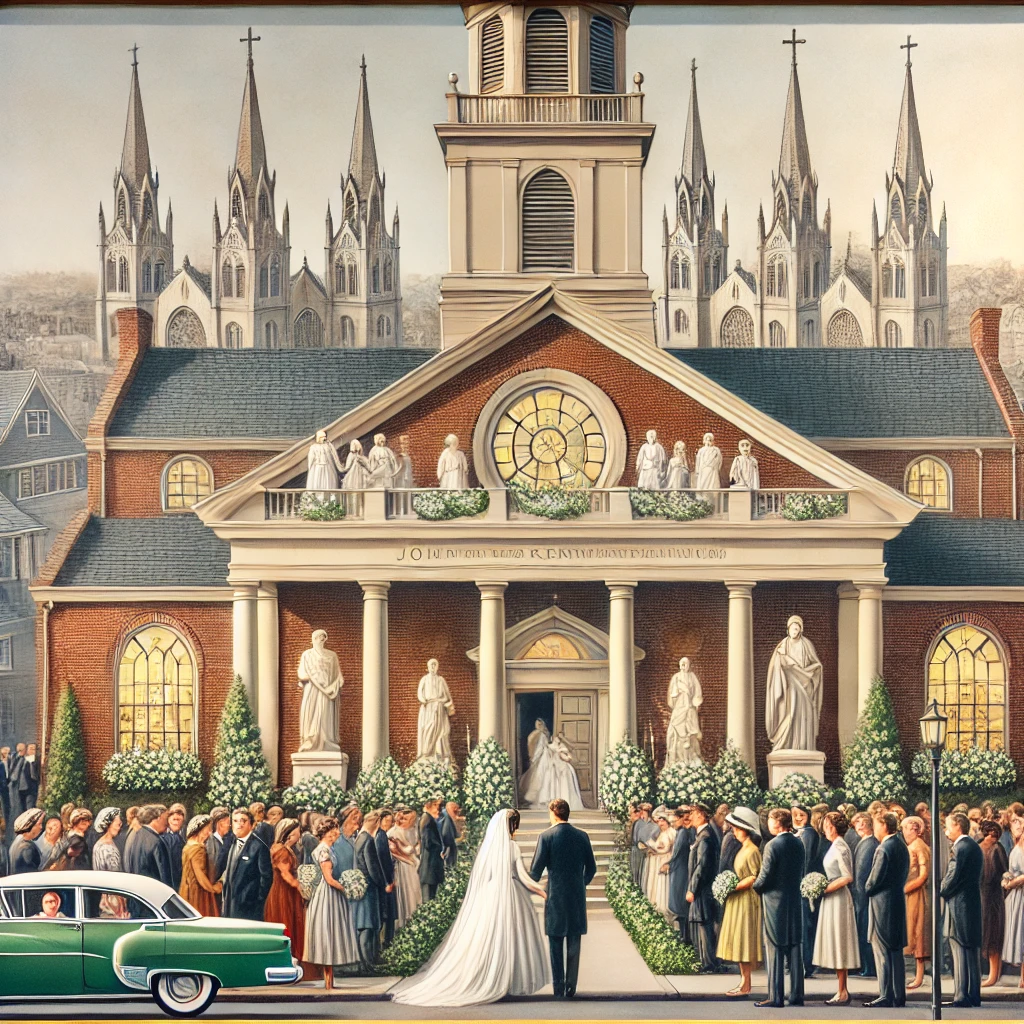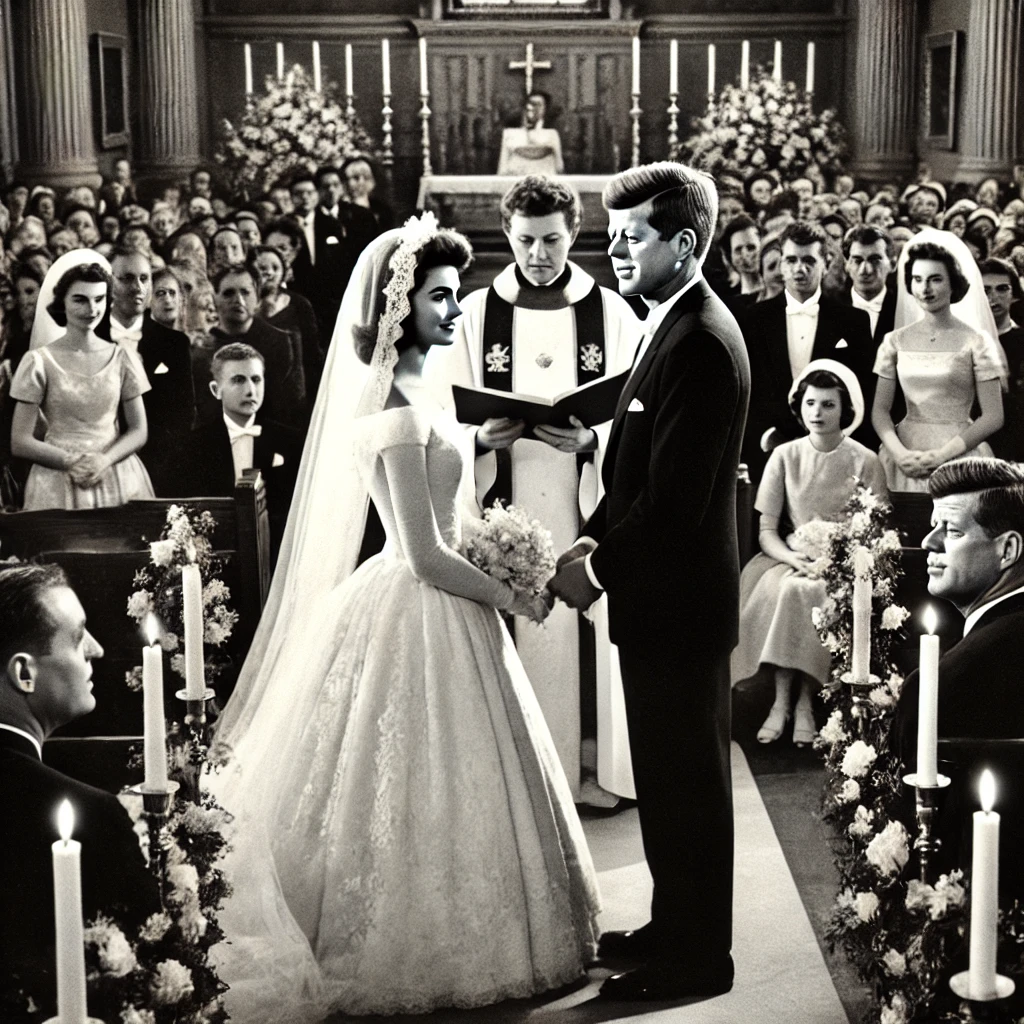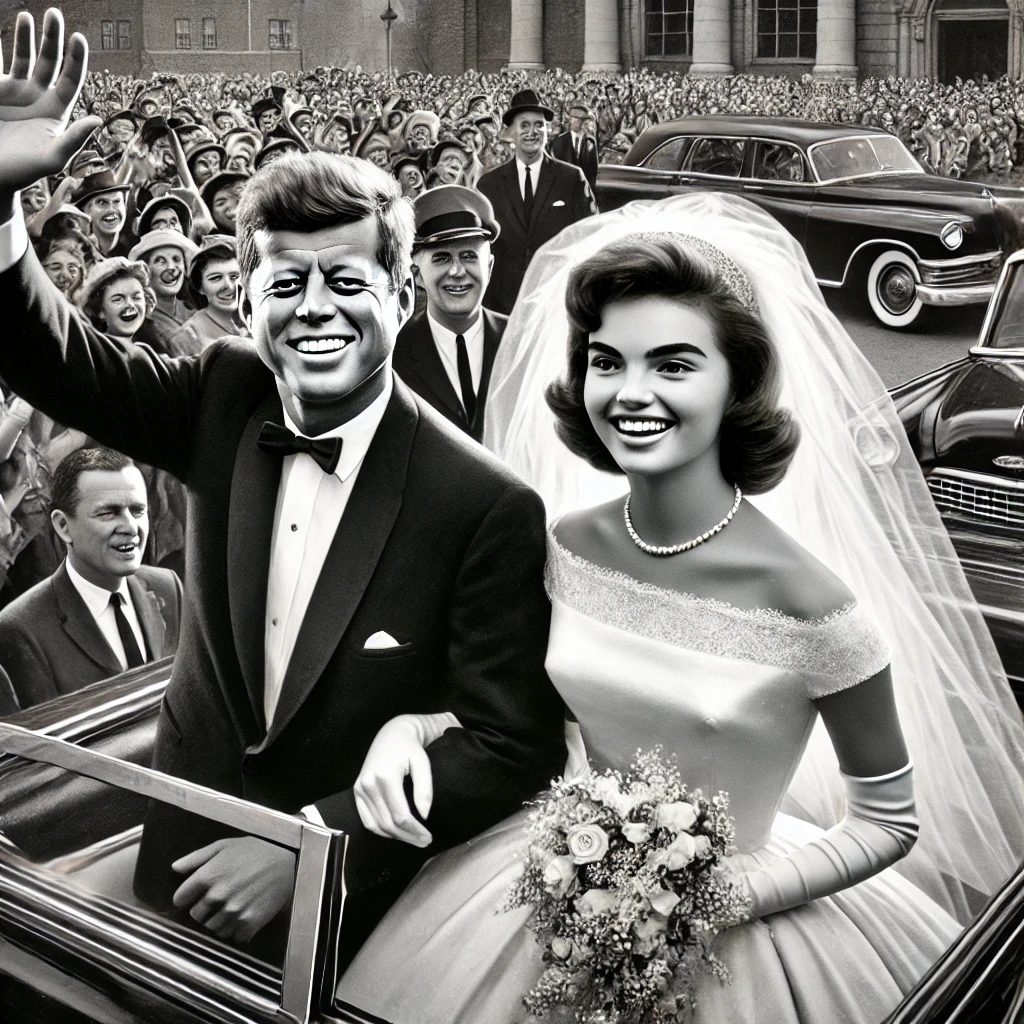On September 12, 1953, U.S. Senator John F. Kennedy and Jacqueline Bouvier exchanged vows in a lavish ceremony that would capture the imagination of the American public and become a defining moment in 20th-century American history. Held in Newport, Rhode Island, the wedding was not just a union of two individuals but a significant event that symbolized the intersection of political influence and societal glamor. The marriage of Kennedy and Bouvier, later known as Jacqueline Kennedy Onassis, was a pivotal moment that shaped American culture and politics for decades to come.
The Wedding Ceremony
The wedding of John F. Kennedy, a rising political figure, and Jacqueline Bouvier, a young socialite and debutante, took place at St. Mary’s Church in Newport, Rhode Island. The church, with its elegant and classic architecture, provided a fitting backdrop for a ceremony that would be attended by a host of prominent figures. Jacqueline, known for her grace and style, wore a stunning gown designed by Ann Lowe, featuring a full skirt and a fitted bodice that became iconic in its own right. The ceremony was a blend of traditional Catholic rites and modern elegance, reflecting the couple’s sophisticated taste and their high-profile status.
The wedding reception, held at the historic Hammersmith Farm, was equally notable for its grandeur. The venue, with its sprawling lawns and picturesque views, hosted a gathering of 800 guests, including political elites, celebrities, and socialites. The reception was a celebration of not just the couple’s union but also their prominent place in American society. The festivities, characterized by their opulence and attention to detail, showcased the Kennedy family’s affluence and Jacqueline’s impeccable sense of style, further cementing their status as cultural icons.

The Impact on American Society
The marriage of John F. Kennedy and Jacqueline Bouvier had a profound impact on American society, marking a period of transformation in the public perception of political figures. The couple’s wedding was more than a personal event; it was a media spectacle that captivated the nation. The coverage of their nuptials, filled with images of elegance and sophistication, set a new standard for how political figures were portrayed in the media. The Kennedy wedding was a symbol of a new era in American politics, where personal charisma and public image played crucial roles in shaping political narratives.
Jacqueline Kennedy, in particular, became a fashion icon and a symbol of grace and sophistication. Her style and poise were widely admired and emulated, influencing fashion trends and setting a high standard for first ladies in the years to come. The Kennedy marriage exemplified a blend of aristocratic elegance and modern American ideals, resonating with a public eager for a new sense of glamor and refinement in its political leaders.
The Influence on American Politics
John F. Kennedy’s marriage to Jacqueline Bouvier also had significant implications for American politics. At the time of their wedding, Kennedy was a U.S. Senator from Massachusetts with aspirations for higher office. The marriage to Jacqueline, who came from a prominent New York family, enhanced his political stature and broadened his appeal. The couple’s union was seen as a strategic move that helped Kennedy build a more formidable public image, combining his political ambitions with Jacqueline’s social prominence.
The Kennedys’ relationship with the media and their adept handling of public appearances played a crucial role in shaping their political careers. Jacqueline’s charm and elegance complemented John F. Kennedy’s charisma, creating a powerful public persona that contributed to his successful bid for the presidency in 1960. Their marriage was a testament to the evolving nature of political campaigns, where personal appeal and media presence were becoming increasingly important.

Jacqueline Kennedy’s Role as First Lady
Jacqueline Kennedy’s role as First Lady of the United States was marked by her commitment to cultural and historical preservation. Her efforts to restore the White House and her work in promoting American arts and culture were highly regarded. Jacqueline’s influence extended beyond her role as a political spouse; she became a prominent cultural figure who reshaped the public image of the first lady. Her style, grace, and dedication to the arts left a lasting legacy that continued to influence subsequent first ladies and set a new standard for public service and personal engagement.
Jacqueline’s impact on American culture was not limited to her time in the White House. Her post-presidency years, during which she worked as a book editor and continued to engage in public life, further solidified her status as a respected and influential figure. Her contributions to literature and culture, coupled with her enduring legacy as a symbol of elegance and resilience, highlighted the continuing influence of her marriage to John F. Kennedy.
The Kennedy Legacy
The legacy of John F. Kennedy and Jacqueline Bouvier extends far beyond their wedding day. Their marriage was a catalyst for change in American society, influencing the way political figures were perceived and the role of the first lady. The Kennedys’ union represented a blend of political ambition, social status, and cultural sophistication, setting a new precedent for future political figures.
The impact of their marriage was evident in the subsequent decades, as the Kennedy family continued to play a prominent role in American politics and public life. The couple’s children, Caroline and John Jr., carried forward their parents’ legacy, contributing to various fields and maintaining the family’s public presence. The Kennedy legacy, shaped by John and Jacqueline’s marriage, remains a significant part of American history and culture.

The Enduring Influence
The enduring influence of John F. Kennedy and Jacqueline Bouvier’s marriage is reflected in the continued fascination with their lives and their impact on American culture and politics. Their story is a reminder of how personal relationships can shape public perceptions and influence historical narratives. The Kennedy marriage remains a powerful symbol of the intersection of politics, society, and glamor, embodying the aspirations and ideals of an era.
The legacy of their union continues to be celebrated through various cultural and historical commemorations. Their wedding and subsequent contributions to American society and politics serve as a testament to the enduring power of personal charisma and public image in shaping the course of history. The marriage of John F. Kennedy and Jacqueline Bouvier remains a defining moment in American history, illustrating the profound impact that personal and public lives can have on shaping a nation’s identity.
Conclusion
The wedding of John F. Kennedy and Jacqueline Bouvier was more than a personal milestone; it was a significant cultural and political event that reshaped the American landscape. The couple’s union represented a blend of elegance, sophistication, and political ambition, setting a new standard for public figures and their influence on society. The enduring legacy of their marriage continues to be felt in American culture and politics, highlighting the lasting impact of their lives and their contributions to the nation’s history.
